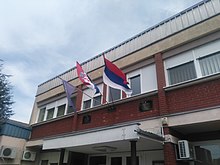Battle of Borovo Selo
The clash was precipitated by months of rising ethnic tensions, violence, and armed combat in Pakrac and at the Plitvice Lakes in March.Twelve Croatian policemen and one Serb paramilitary were killed before the Yugoslav People's Army (JNA) intervened and put an end to the clashes.In 1990, following the electoral defeat of the government of the Socialist Republic of Croatia by the Croatian Democratic Union (Hrvatska demokratska zajednica – HDZ), ethnic tensions between Serbs and Croats worsened.The Yugoslav People's Army (Jugoslovenska Narodna Armija – JNA) confiscated the weapons of Croatia's Territorial Defence (Teritorijalna obrana – TO) in order to minimise the possibility of violence following the elections.[1] On 17 August, inter-ethnic tensions escalated into an open revolt of the Croatian Serbs,[2] centred on the predominantly Serb-populated areas of the Dalmatian hinterland around Knin,[3] and parts of Lika, Kordun, Banovina and eastern Croatia.[5] In March 1991, SAO Krajina authorities, backed by the government of Serbia, began consolidating control over the Serb-populated areas of Croatia, resulting in a bloodless skirmish in Pakrac and the first fatalities in the Plitvice Lakes incident.[11] In addition, White Eagles paramilitaries arrived in Borovo Selo in mid-April at the request of local militia commander Vukašin Šoškoćanin.The paramilitaries were either armed directly by Serbia's Ministry of the Interior or by a militia linked to the SAO Krajina, with the approval of the Serbian authorities.[12][13] By the end of April 1991, the White Eagles in Borovo Selo were joined by fighters from the Dušan the Mighty paramilitary unit, which was linked to the Serbian National Renewal party.[17] The rockets were fired by a group of men who were led to the site by Osijek police chief Josip Reihl-Kir, who was later killed by Croatian irregulars.[13] Nikola Jaman, then a reserve unit commander in the Ministry of the Interior, later stated that he had led the action, and denied that Šušak, Glavaš and Vukojević had been involved.[6][26] According to the Croatian historian Davor Marijan, Tuđman's decision not to retaliate against the JNA was often interpreted at the time as cowardice bordering treason, leading to public criticism and the resignation of General Martin Špegelj from the post of defence minister.Nonetheless, the decision afforded Croatia much-needed time to prepare for war, as Yugoslav Navy Fleet Admiral Branko Mamula later acknowledged.[39] In February 2012, an Osijek court convicted Milan Marinković of war crimes and sentenced him to three-and-a-half years in prison for mistreating two captured Croatian police officers.


Croatian War of IndependenceYugoslav WarsBorovo SeloCroatiaSAO KrajinaWhite EaglesVukašin ŠoškoćaninVojislav ŠešeljJosip Reihl-KirKrajina Territorial DefenseKrajina MilitiaDušan the MightyCroatian PoliceCroatian War of IndependencePakracPlitvice LakesZadar riotSplit protestStingerHrvatska KostajnicaKijevoLabradorBanija villagesVukovarMassacreBrđaniOsijekGospićPetrinjaKusonjeKorana bridgeThe BarracksVaraždinBjelovarŠibenikJNA campaignDubrovnikCerićBanski DvoriŠiroka KulaBogdanovciErnestinovoBaćinSaborskoLibertas convoyPožegaSwath 10Dalmatian channels KostrićiŠkabrnjaAntunovacVance planWhirlwindPaulin DvorGornje JameOrkan 91VoćinJoševicaDevil's BeamBruškaVrsar airportSarajevoECMM helicopter downingBaranjaJackalMiljevci PlateauLiberated LandKonavleVlašticaMaslenicaMedak PocketAngelaWinter '94Leap 1MedariZagrebLeap 2Summer '95KomićKijaniGolubićUzdoljeBosanski Petrovac bombingGruboriGošićMaestral 2VarivodeVukovar '95Timeline of all major eventsLog RevolutionEvents in SerbiaCroatianSerbiaSerbianYugoslav flagflag of CroatiaCroatian SerbYugoslav People's ArmyCroatsmutilatedPresidency of Yugoslaviawar crimeselectoral defeatSocialist Republic of CroatiaCroatian Democratic UnionTerritorial Defenceopen revoltCroatian SerbsDalmatianKordunBanovinaeastern CroatiaCroatian PresidentFranjo TuđmanCroatian independenceYugoslaviaMilan BabićMilan MartićSerb Autonomous Oblast of Krajinabloodless skirmish in PakracPlitvice Lakes incidentpolice personnel3,000-strong special policeBorovo NaseljeVinkovcimodern county